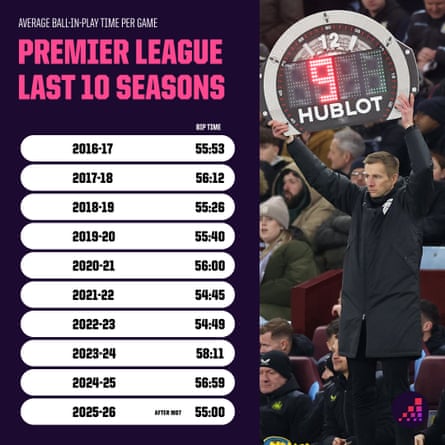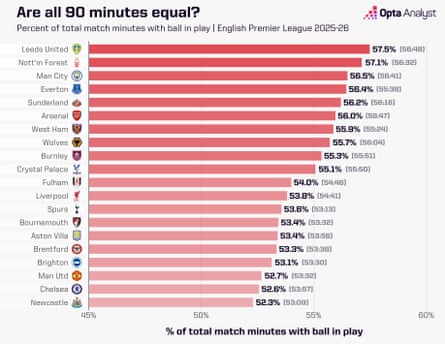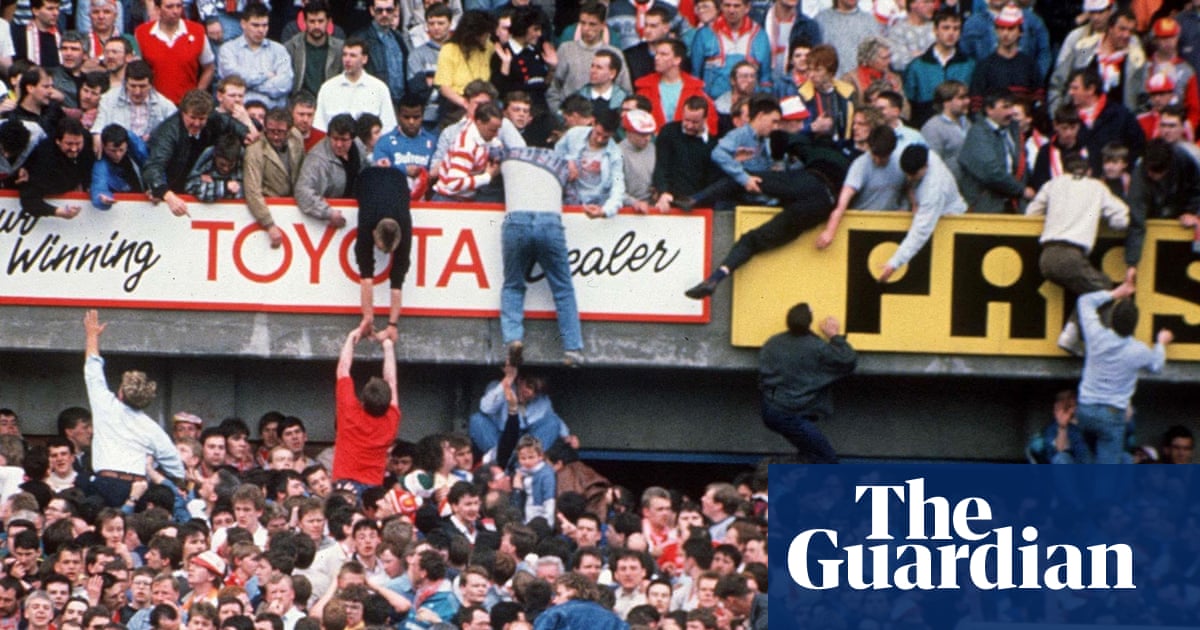The start of every football match brings a little flutter in the stomach. Will the stars perform? Will the referee have a good game by giving your players every decision? And will the football gods shine down on your team? A more pertinent question to ask this season, though, is how much football will we actually see?
We wrote about ball-in-play time a few seasons ago, revealing that fans were not seeing as much football as in previous years. We’re not saying our data nosiness led to referees adding more stoppage time, but there was a notable rise in ball-in-play time over the next two campaigns. It went up from 54 minutes and 49 seconds in 2022-23 to 58 minutes and 11 seconds in 2023-24. It’s still early in the 2025-26 season, but the pendulum may be swinging back the other way.
How much is the ball in play in 2025-26?
We have seen an average ball-in-play time of just 55 minutes per game this season – down from 56 minutes and 59 seconds last season. Stoppage time has crept up – games last 100 minutes and 35 seconds on average this season, which is 51 seconds longer than last season – but the ball is in play for almost two minutes fewer. Fans are spending two minutes and 50 seconds longer than last season waiting for restarts, roughly the time it takes to listen to You’re the One That I Want by John Travolta and Olivia Newton-John.

There are 45 minutes and 35 seconds of delays/pauses per game this season – or roughly one episode of Countdown. We could be struggling to solve a conundrum rather than watching someone saunter over slowly to take a corner. For clarity, a “delay” is the time between the ball going out and play resuming for corners, free-kicks, throw-ins, goal-kicks, kick-offs, penalties and drop balls. The ball has been in play for just 54.7% of the time this season; the lowest it’s been over the past 10 full seasons is 55.7%, which was in 2022-23.
So, which teams are giving us the most action? Despite being recently promoted and considered underdogs in most of their games, Leeds are averaging the longest ball-in-play time in the league this season at 56 minutes and 48 seconds (57.5% of total minutes). It either means Daniel Farke is happy for his side to get on with it, or their opponents are doing their utmost to keep the ball in play.

Newcastle games have the lowest proportion of ball-in-play action at 52.3% (53 minutes and nine seconds on average), closely followed by Chelsea (52.6%) and Manchester United (52.7%). One match in particular has dragged Newcastle’s numbers down.
The longest shortest game
Newcastle’s five-goal thriller against Liverpool has the lowest ball-in-play time this season, which is quite something when you consider it lasted 109 minutes and 24 seconds – the third longest match of the season so far.
There were 31 fouls, the joint-second most in a Premier League match this term, which created delays of 27 minutes and seven seconds. Newcastle averaged 67 seconds per free-kick, at least 10 seconds longer than any other team has averaged in a game.

There was 13 minutes and 43 seconds of stoppage time in the second half, the most in a Premier League match this season. Despite the added time, the ball was in play for just 45 minutes and 55 seconds (42%). So, for 63 minutes and 29 seconds of that game, nothing was happening. It’s astonishing to think there were five goals, including Rio Ngumoha’s late winner for Liverpool.
Not far behind was Brighton’s 3-1 win at Chelsea, when the ball was in play for just 46 minutes and 44 seconds of the total time of 105 minutes and 14 seconds (44.4%). At the other end of the value-for-money scale, the ball was in play for 63.4% of Leeds’ 3-1 win at Wolves.
Who are the slowest at set-pieces?
Sunderland are spending the most time over each corner, with almost 50 seconds per corner. Arsenal, who topped this list last season and are second this term, have won more corners than any other team this season (53) so are comfortably ahead when it comes to total time to take them. Mikel Arteta’s team have spent 40 minutes and six seconds taking corners this season – at least 11 minutes and 12 seconds more than any other team.
All three goals in their recent game against Newcastle were scored from corners, which wasn’t that surprising considering 19 corners were awarded in the game. In total, 12 minutes and 14 seconds of that game was taken up by delays for taking corners, the most in a match this season.

Wolves are the quickest to take their corners, closely followed by Manchester City, who both average less than 30 seconds. There is not any clear correlation between time taken over corners and their effectiveness. Arsenal take the second longest time and have scored the most goals from corners this season (six), but Chelsea have scored the second most (five) despite taking the third shortest time. Sunderland and Wolves, who are at either end of the spectrum, have scored one each. Manchester City (29.1 seconds) are yet to score from a corner, but so are Liverpool (40.6 seconds).
Compared to last season, teams are generally spending more time taking corners, goal-kicks and throw-ins. Given the number of long throws we’re seeing, that is no surprise, with throw-ins taking an average of 17.7 seconds this season compared to 15.6 seconds last term.

Goal-kicks are also taking two seconds longer (30.3 seconds, up from 28.3 seconds), but corners have seen the most noticeable jump, up to 36.9 seconds from 33.6 seconds. With each corner taking 3.3 seconds longer on average, if we end up seeing the same number as last season (3,890), we will have spent more than three and a half hours extra waiting for them across the campaign.
Brentford are taking almost four seconds longer than any other team on throw-ins. This is largely because so many of them are long – the Bees have taken 34 long throws into the opposition’s box, more than any other team – so they generally take more time to line everything up. Wolves are taking almost half the time on average, just 12.7 seconds per throw-in, the quickest in the division.

Sunderland are taking the longest over goal-kicks (36.7 seconds) and Nottingham Forest are the quickest. They have needed just 26.2 seconds per goal-kick, a steep decline from last season when their average of 34.1 seconds was the longest in the division.
Free-kicks can be tricky to read, as they depend on where they are won. Deep inside your own half and chances are you’ll take it quickly, but within 10-20 yards of the opposition’s box and you’re far more likely to take your time lining up a cross or shot. For what it’s worth, Crystal Palace (41.6 seconds) and Brentford (41.0 seconds) spend the longest average time taking free-kicks, while Fulham (25.8 seconds), Brighton (26.8 seconds) and Liverpool (26.9 seconds) take them quickest.
Not so busy Bees
Taking all delays into account, Brentford are spending the most time getting the ball back into play, taking 33.5 seconds on average to do so. They are closely followed by promoted pair Burnley (32.7 seconds) and Sunderland (32.3 seconds), but also not far behind are Arsenal and Manchester United (both 31 seconds).
Wolves are the fastest at getting the game going again (24.1 seconds). Given that they are bottom of the Premier League with just two points after seven games, perhaps they should consider slowing down a bit. Manchester City (25.6 seconds), Nottingham Forest (26.4 seconds) and Liverpool (26.8 seconds) are also eager to get the ball back in play. Again, that is a big change from Forest, who were the slowest in the league last season at restarting play (32.2 seconds).

So, there you have it. We are getting some of the longest football matches we have ever seen in the Premier League, but we’re not seeing more football, unless you enjoy the sight of a player with the ball under his arm waiting for teammates to flood the box. We’re not here to judge.
This is an article by Opta Analyst

.png) 1 month ago
41
1 month ago
41

















































